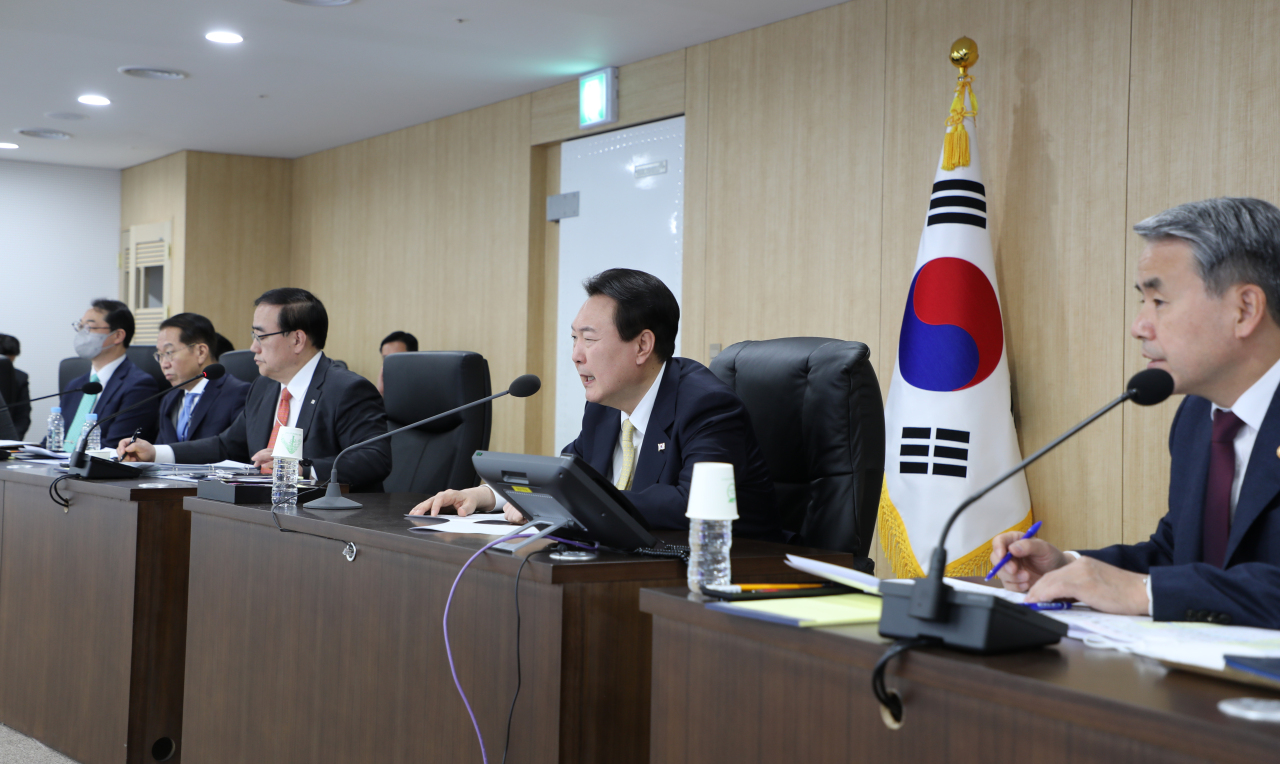South Korean President Yoon Suk-yeol on Friday called for a strengthened defense posture and tough economic sanctions on North Korea after the country launched another intercontinental ballistic missile.
 m
m
President Yoon Suk-yeol (2nd from R) attends a National Security Council meeting at the presidential office in Seoul
on Nov. 18, 2022, in this photo provided by the office. (Yonhap)
“President Yoon instructed to strengthen the South Korea-US combined defense posture, actively implement the measures agreed between South Korea and the US to enhance the viability of US extended deterrence and reinforce security cooperation among South Korea, the US and Japan,” the presidential office said in a press statement, adding that the president was briefed right after the summit with Spanish Prime Minister in the morning.
Yoon also ordered officials to “push for strong condemnation and sanctions against North Korea, including a response at the UN Security Council, in tandem with the US and the international community.”
In addition, the South Korean government warned that it “will not tolerate North Korea’s provocation” in a statement issued following the ICBM launch. The government pledged to “work closely with the UN and the international community to hold North Korea accountable for its provocation based on close coordination between South Korea and the US.”
“The South Korean government has overwhelming response capabilities and will to immediately punish any provocation by North Korea, so North Korea should not miscalculate it,” the statement read.
The White House also strongly condemned North Korea for its “test of a long-range ballistic missile,” National Security Council spokeswoman Adrienne Watson said in a statement.
US President Joe Biden will continue close consultations with allies and partners, building on his meeting with Yoon and Japanese Prime Minister Kishida Fumio on Sunday, according to Watson.
“The United States will take all necessary measures to ensure the security of the American homeland and Republic of Korea and Japanese allies.”
Kishida denounced North Korea for firing the missile, which is believed to have fallen into waters within Japan’s exclusive economic zone, EEZ, approximately 250 kilometers west of Hokkaido.
This is the first North Korean missile to land in Japan’s EEZ since March.
Japanese Defense Minister Yasukazu Hamada on Friday said the ICBM could have traveled over 15,000 kilometers if it was fired at a normal angle.
North Korea fired the missile from Sunan District, Pyongyang, toward the East Sea at around 10:15 a.m. local, South Korea’s Joint Chiefs of Staff said in a statement.
The ICBM traveled about 1,000 kilometers, reaching a top speed of Mach 22 and an altitude of around 6,100 km, the statement said.
The warhead was successfully separated from its first and second stages, according to a military source, who wished to remain anonymous due to the sensitive nature of the issue. The missile, fired on a “lofted” trajectory that is largely upward, traveled for more than one hour, the source said.
The South Korean military evaluated that North Korea was likely to fire a new Hwasong- 17 ICBM in around two weeks. North Korea’s launch of what appeared to be the new Hwasong-17 ICBM on Nov. 3 ended in failure.
South Korea’s JCS said its chief, Gen. Kim Seung-kyum, and Gen. Paul LaCamera, chief of the United Nations Command and United States Forces Korea, immediately held a virtual meeting and closely shared their assessment of the ICBM launch. Both confirmed that the allies will “further reinforce combined defense posture against any North Korean threats and provocations.”
“Our military will maintain a firm readiness posture to overwhelmingly respond to any North Korean provocations,” the JCS said, adding the military will “track and monitor related moves in preparation for additional provocations by North Korea in close coordination with the US.”
North Korea continued missile launches for a second day, after North Korean Foreign Minister Choe Son-hui on Thursday sent a “serious warning” against enhancing trilateral military and security cooperation among South Korea, the US and Japan.
Choe warned that North Korea will take “fierce” tit-for-tat military actions corresponding to the moves by the US and allies to reinforce their deterrence and readiness posture against North Korea. Hours after Choe’s warning, North Korea fired a short-range ballistic missile from near Wonsan, Kangwon Province, toward the East Sea on Thursday.
North Korea has fired more than 60 ballistic missiles just this year, continuing its record-breaking pace. Friday marks the eighth ICBM launch this year.
Source:koreaherald.com/
 m
m